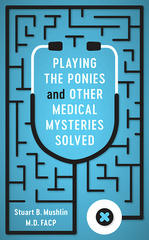Diagnosis, Therapy, and Evidence
Conundrums in Modern American Medicine
By Gerald N. Grob and Allan V. Horwitz
Rutgers University Press
In Diagnosis, Therapy, and Evidence, Gerald N. Grob and Allan V. Horwitz employ historical and contemporary data and case studies, combining into one book a variety of medical and psychiatric conditions. They utilize case studies and examine tonsillectomy, cancer, heart disease, PTSD, anxiety, and depression, and identify differences between rhetoric and reality and the weaknesses in diagnosis and treatment
This book deserves to be in the libraries of medical schools and schools of public health. Recommended.
Through a series of fascinating cases, Grob and Horwitz show how the diagnostic and treatment rhetoric of medicine and psychiatry often far exceeds the scientific evidence. A significant contribution to our understanding of medicalization.
Medical historian Gerald Grob and medical sociologist Alan Horwitz provide an important and carefully crafted interdisciplinary analysis of how numerous therapies are introduced into clinical practice in the absence of clear and compelling data and kept alive by a combination of faith, analogy, tradition, ideology, inertia, and politics.
This book is an outstanding collection of highly informative and well-written chapters that aim to provide the reader with an understanding of the complexities of diagnosis and treatment in some important chronic diseases, from peptic ulcers to post-traumatic stress disorder. The authors bring together into one book a variety of medical conditions that have been discussed in different places, allowing a rich comparison of their similarities and differences.
The case study structure of the book nicely reflects the authors' disciplinary interests and is justified by the burden of their argument—which turns on the complex and contingent nature of the historical and sociological processes through which diseases are defined and managed.
This book deserves to be in the libraries of medical schools and schools of public health. Recommended.
Through a series of fascinating cases, Grob and Horwitz show how the diagnostic and treatment rhetoric of medicine and psychiatry often far exceeds the scientific evidence. A significant contribution to our understanding of medicalization.
Medical historian Gerald Grob and medical sociologist Alan Horwitz provide an important and carefully crafted interdisciplinary analysis of how numerous therapies are introduced into clinical practice in the absence of clear and compelling data and kept alive by a combination of faith, analogy, tradition, ideology, inertia, and politics.
This book is an outstanding collection of highly informative and well-written chapters that aim to provide the reader with an understanding of the complexities of diagnosis and treatment in some important chronic diseases, from peptic ulcers to post-traumatic stress disorder. The authors bring together into one book a variety of medical conditions that have been discussed in different places, allowing a rich comparison of their similarities and differences.
The case study structure of the book nicely reflects the authors' disciplinary interests and is justified by the burden of their argument—which turns on the complex and contingent nature of the historical and sociological processes through which diseases are defined and managed.
Gerald N. Grob is the Henry E. Sigerist Professor of the History of Medicine Emeritus in the Institute for Health, Health Care Policy, and Aging Research at Rutgers University. He has written extensively, including The Dilemma of Federal Mental Health Policy: Radical Reform or Incremental Change? (Rutgers University Press).
Allan V. Horwitz is a professor of sociology and dean for social and behavioral sciences at Rutgers University and the coauthor of The Loss of Sadness: How Psychiatry Transformed Ordinary Misery into Depressive Disorder.
Preface
List of Abbreviations
Chapter 1 Rhetoric and Reality in Modern American Medicine
Chapter 2 Medical Rivalry and Etiological Speculation
Chapter 3 How Theory Makes Bad Practice
Chapter 4 How Science Tries to Explain Deadly Diseases
Chapter 5 Transforming Amorphous Stress into Discrete Disorders
Chapter 6 Creating Consensus From Diagnostic Confusion
Chapter 7 Post-Traumatic Stress Disorder
Where Do We Go From Here?
List of Abbreviations
Chapter 1 Rhetoric and Reality in Modern American Medicine
Chapter 2 Medical Rivalry and Etiological Speculation
Chapter 3 How Theory Makes Bad Practice
Chapter 4 How Science Tries to Explain Deadly Diseases
Chapter 5 Transforming Amorphous Stress into Discrete Disorders
Chapter 6 Creating Consensus From Diagnostic Confusion
Chapter 7 Post-Traumatic Stress Disorder
Where Do We Go From Here?






